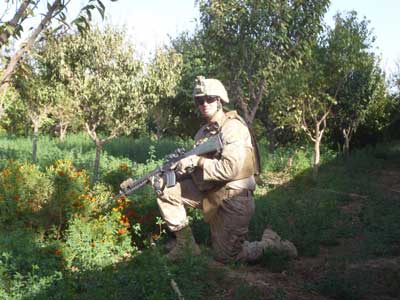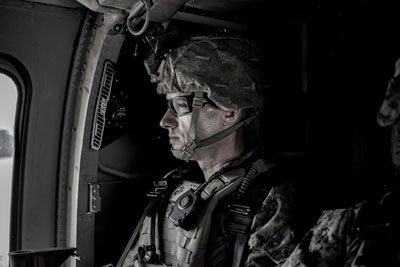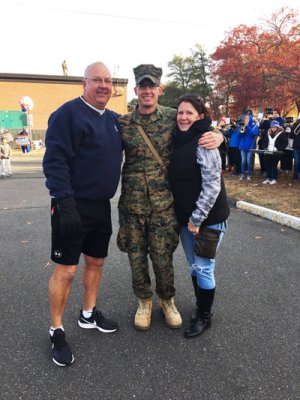We Forever Carry With Us the Good, Bad, and Ugly of Our Service and What We Learned From It
“Sean, can you go assist that gentleman outside? He was in the Marines too, so I figured you’d have something to bond over.”
I rolled my eyes. This was my first job post-college, and I didn’t like advertising my service in the civilian world. I also bristled at being told to do business with someone simply because they had a military background like me.
Looking back now, though, I wish I’d embraced my service far sooner than I actually did.

Sean Filip, a member of the personal security detail for the commanding general of Task Force Southwest, on the flight line at Camp Shorab awaiting a distinguished visitor in 2019. Photo courtesy of the author.
It recently occurred to me that the theory of quantum superposition—that matter can occupy two places at once—applies to me and just about every veteran who has hung up the uniform and entered civilian life. (I’m not a physicist, but I have worked with people a lot smarter than me, so I’ve heard the theory a few times now.)
Like many veterans of my generation, 9/11 played a role in my decision to join the military—although not in the way you might think. I was 12 when my classmates and I watched the second plane strike the World Trade Center. The televisions went off after that, and although I had some understanding of what had just happened, I couldn’t know the impact of what would come next.
My brother joined the Marine Corps. He died in 2005 in a noncombat-related incident, and although I long told myself 9/11 was my catalyst for joining the Marines, it wasn’t. I had watched military service transform my brother, and I wanted that. I also felt like I could do something about his death if I too were a Marine.

Sean Filip on patrol in Helmand province, Afghanistan, in 2011. Photo courtesy of the author.
So I served my time. And then, as happens to most of us, I transitioned to life as a civilian. It was 2014, and I was done, bitter about a delayed promotion to sergeant. The Corps was also offering early outs for Marines within six months of their end of active service agreement date. I took it. I didn’t know what I wanted to do. As I waited for the results of a civil service test that could possibly secure me a place with the Boston Police Department, I worked in sales for a digital marketing company and studied for the GRE.
It took less than a year to realize I had made an emotionally charged decision to leave the Marines, and I regretted it. I rejoined my unit in early 2016 and was a full-time student pursuing a master’s degree in political science. I was left trying to figure out how to navigate what now seemed like a double life—a quantum superposition. I’d spent years receiving training, mentoring, and leadership experience. But I didn’t know the best way to apply it.
Award-Winning Journalism in Your Inbox
It took me years to figure it out—four to be exact. In the beginning, I tried to hide my service. Though I listed it on my resume, I didn’t talk about it. I wasn’t ashamed of my service. I just didn’t know how to translate my time in the Marine Corps into life as a civilian. After finishing college, I’d learned that most people didn’t care, or their comments and questions struck me as insensitive (or just annoyed me).

Sean Filip on deployment. After leaving the Marines, he struggled to figure out how his military service fit into his life as a civilian. Photo courtesy of the author.
But when things didn’t get done on time, or no one stepped up and took the lead, my military training kicked in. I took the initiative.
I finished my last deployment in 2019 and officially left the Marine Corps Reserves in 2020 (insert unoriginal reservist joke here). And only then did I decide that I was going to capitalize on my incredibly unique skill set.
I first had to learn the art of being tactful. You cannot go “high and to the right” in the professional world—and it rarely ever works in the military anyway. I put my experience to good use by developing processes and coming up with solutions to solve problems, something all of us who served were forced to do at a very young age with very real consequences if we didn’t.

Sean Filip with his parents, Paul and Donna, after returning home from Afghanistan in 2019. Photo courtesy of the author.
Many of us led others in training and combat. We mentored junior Marines, sailors, airmen, and soldiers. We counseled and were counseled on performance. We drafted and created performance plans for those under our charge who struggled to meet expectations. We made tough decisions in harsh environments that no business professional has ever had to consider. As an infantry Marine, I had to learn quickly what right and wrong looked like, both in leadership as well as when carrying out basic tasks.
The point is, we’re assets. We exist in a space that only a small number of Americans can stake claim to. We will forever carry with us the good, bad, and ugly experiences of our time in the military, our deployments, and the sacrifices we made. Most of us can draw on more leadership and management experience than some midcareer business professionals.
Our Journalism Depends on Your Support
I’ve learned there is a business application for everything I did during my time in the military. I’ve learned to translate my experience into a language civilians understand. It took time, and I’m still honing these skills every day. It is a work in progress. But I know now that I bring to the table years of experience in leadership, management, and strategic planning that I can directly apply to the civilian world. I know these experiences will help me and my company succeed because I have found a way to exist in both spaces, leveraging experiences from one to enhance my performance in the other.
Once I began to embrace and harness this, I again found success.
This War Horse reflection was written by Sean Filip, edited by Kristin Davis, fact-checked by Jess Rohan, and copy-edited by Mitchell Hansen-Dewar. Abbie Bennett wrote the headlines.





Comments are closed.